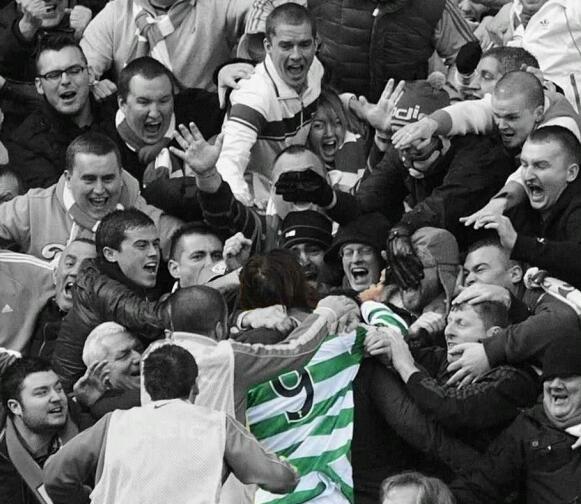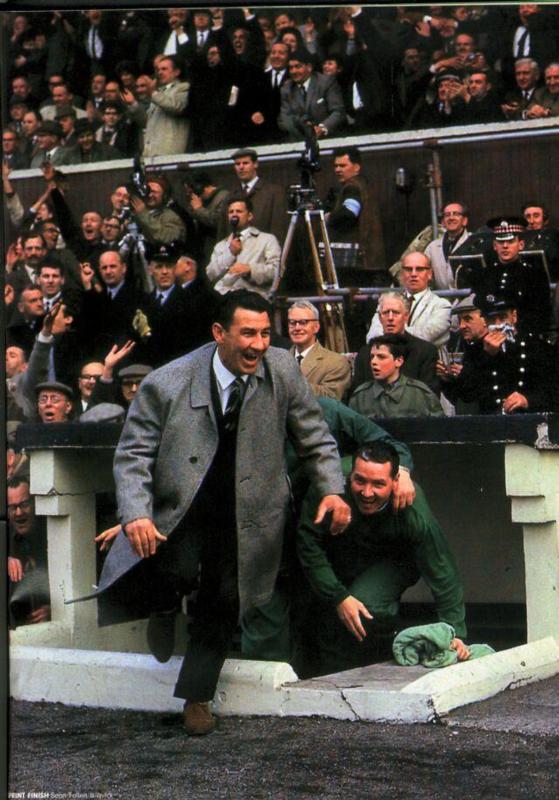However, in this single conversation last week, I realised that Georgios Samaras had finallybeen accepted by the Celtic support. If this mate of mine – a former serial Sami basher, was willing without condition to evoke the idea that Georgios Samaras was a Celtic matchwinner, then the Greek has completed a quite remarkable turnaround of opinion.Bearing all this in mind, I thought it would be worthwhile to recall and examine Samaras’ Celtic career up to this point, and indeed the rollercoaster journey that his reputation has followed.
Signed by Gordon Strachan initially on loan, Samaras arrived at Celtic with mixed reviews. Having been something of a youth prodigy at OFI Crete, where his father had played previously and gone on to become manager, Samaras started his professional career in Holland with Heerenveen where he made 88 appearances from 2002-2006, scoring 25 goals. In 2006, he was signed by Stewart Pearce’s Manchester City for £6m. Despite providing a few highlights of what was a poor year for the club, Samaras struggled to settle in the English Premier League and receivedcriticism from fans and manager for poor decision making and a failure to handle the more physical aspects of the game.
Arriving in the January transfer window of 2008, Samaras’ exploded onto the scene at Celtic, coming on as a late substitute against Kilmarnock as Celtic led 4-1 at Rugby Park. With his first touch of any significance, he latched onto a ball out to the right touchline just inside the Kilmarnock half. He proceeded to stroll past his marker before lifting his pace and gliding along the 18 yard line,dragging two other defenders towards him before coolly passing the ball into the far corner with his left foot. Now, here was something we hadn’t seen at Celtic. The modern striker – tall, fast, technical and composed. This was a goal that conjured up images of Zlatan Ibrahimovic and Dimitar Berbatov. Celtic supporters collectively wondered if Georgios Samaras was going to be our version. Used mainly as a substitute, Samaras weighed in with a few important goals as Celtic embarked on a rollicking run-in and one of the most remarkable comebacks in our history as we claimed the 2007/08 title.The following season started well for Celtic and Samaras was on good form, scoring 17 goals. Most of these, however, came in the first half of the season, with Scott McDonald, Jan Vennegoor of Hesselink and Samaras all succumbing to injury and/or a loss of form in the run-in as Celtic miserably misfired and surrendered the title to Rangers on the last day of the season.
Although there was some scepticism about Samaras amongst fans during this early period, I believe during the Tony Mowbray debacle, it crystallised into withering and widely held distaste. Hungover from the stolid, emotionless and disappointing final season under Strachan, and underwhelmed with the continued lowering of expectations under the new manager, a string of truly awful performances and results convinced us all that Celtic Football Club were in a deep, dark rut. It was a difficult period for all involved, and saw huge disillusionment and crowds fall significantly. The exasperation of the home crowd especially was never far from the surface, and Georgios Samaras often bore the brunt of it.
There are a few reasons why Samaras was the main victim of the “och FFS” brigade. The first and main one is undeniable, that Samaras can be an infuriating player to watch. Under Mowbray he often appeared out of sync with his teammates, languid, went to ground too easily and constantly had a look of vague bewilderment on his face when things didn’t go his way, which was a significant proportion of the time. Such criticism of Samaras was at least grounded in reality, this frustrating side of his game evident in the early part of his Celtic career but particularly throughout the abject Mowbray reign, which also saw his hardly prolific scoring prowess grind to a virtual halt. This forced many Celtic supporters to question “the point of Samaras”. More ominously though, there emerged another more unfortunate and crass form of comment regarding Celtic’s number 9 during this time. Simply, that he was lazy, soft and had no heart. Possessing all the qualities that will earn a football player in Scotland the label “big Jessie” was his biggest crime, and this idea of Samaras being quite pathetic was widely held. His hairstyle, his demeanour and the fact that he made a habit of showing concern for opponents who were hurt all were used as sticks which with to beat him. At home games, I began to notice an almost pre-emptive feeling of people wanting him to slip up so they could jeer him. I would watch Aiden McGeady fail to beat his man in an almost parallel of something Samaras had done previously. Where Aiden would receive applause and encouragement for his efforts, Samaras endured exasperation and mockery. There were dozens of occasions where I wanted him to turn it on, skin his man and burst the net, just to get it round these so-called supporters. During season 2009/2010, it just didn’t happen, for Samaras, for us, for Celtic.
The infamous 2-0 Scottish Cup Semi-Final defeat against Ross County summed up Celtic’s appalling season. The outpouring of fury in the aftermath of this embarrassing showing, resulted in a few hundred fans heading to Celtic Park to greet the team, led off the bus by newly-appointed caretaker manager Neil Lennon, and letting them know exactly what they thought of them. I wasn’t there that day, but my heart sank when I heard what had transpired. While none of the team escaped the abuse dished out by Torch-and-Pitchfork CSC, the treatment meted out to Samaras was reported to be nothing short of savage. The hecklers reserved twice as much invective for him as he trudged off the team bus. Regardless of this, the “useless bastard” elected to approach the young kids waiting for autographs to sign them, while most other players quickly escaped and one even decided to respond with catcalls of his own, even trying on a bit of the old “haud me back.”In a list of who let Celtic down that day, Georgios Samaras would be much further down the list than the aforementioned player, a marquee signing and, it pains me to say, our current captain. He lashed Celtic’s best chance of the game against the post from 6 yards with 5 minutes left, summing up his entire season in one motion. Celtic were a sorry lot on the day, but Samaras was one of the few players who never stopped trying, yet he was in many ways scapegoated and used as an example of the psychological and attitudinal problems of this current Celtic team by the fans.
On being appointed Celtic manager, Neil Lennon embarked on the “major surgery” he had referred to after Ross County. Samaras would have been first on many supporters’ lists to be moved on, yet Lennon obviously saw that big Georgios had something to offer us yet. Used sparingly in the first half of the season as Lennon’s new strike force of Gary Hooper and Anthony Stokes forged a formidable goal-scoring partnership, there were few chances for Samaras to impress. There was a rare start against Inverness Caledonian Thistle in the Scottish Cup which yielded a hat-trick, but league duty saw Lennon sticking with a 4-4-2 with the in-form nippy strikers his first picks. On January 2nd 2011 however, Celtic arrived at Ibrox to play league leaders Rangers with somewhat of an injury crisis. The dynamic duo of Hooper and Stokes were both injured, and with Celtic having to draft in the supposedly unreliable figures of Charlie Mulgrew and Paddy McCourt in midfield with Samaras as the lone striker, the air was thick with anticipation of what could be Celtic’s heaviest defeat at Ibrox for years. Let it not be forgotten how completely written off we were that day. This would be time for the wily old fox of Scottish football to put the young firebrand in his place and all that. Neil Lennon had other plans. As we all know, in what may well be remembered as the performance of his career, Samaras was unplayable. The first of his two goals, a break up the park from a magnificent Joe Ledley pass, rounding the assailing figure of Allan McGregor and slotting the ball home at pace from an ever tightening angle before being immersed in the hysteria of the Broomloan Road Stand, was an iconic and monumental moment in Neil Lennon’s managerial career. The second was a penalty which Samaras single-handedly won. Celtic were under some sustained pressure as Rangers chased an equaliser, Samaras received the ball from James Forrest halfway inside the Celtic half and took it for a run up the right wing while somebody once touted as the next Jim Baxter after one appearance gave chase. Samaras lifted his stride once, and then, clearly meaning business, shifted up to another gear, galloping past his marker and cutting into the 18-yard box before being fouled by the confounded figure of Majid Bougherra. Samaras picked up the ball, and despite Craig Thomson’s best efforts to put him off, slotted it away. This was a triumphant display from Celtic, inspired by the Greek who his manager told the media afterwards had every attribute to be “world class.”
Unfortunately, the goodwill that this and further excellent performances against Rangers that season brought Samaras was undone by his penalty miss in the potentially title deciding 0-0 at Ibrox in April, as Celtic blew the chance to win what would have been one of the sweetest titles in our history. The dismal display at Inverness, and the Samaras penalty miss would be rued for a long time. Some even felt that our not selling Samaras post-seasonwas the fly in the ointment of what had been a positive season. The following season’s European hopes got off to a poor start with a stuttering home draw against Sion. Perhaps it was simmering resentment from the penalty miss at Ibrox, perhaps it was a nervy crowd at Parkhead venting their frustration or perhaps he was just especially bad, but Samaras was berated like never before throughout that game. There was outrage when Anthony Stokes was substituted before Samaras, and a huge ironic cheer when number 9 finally went up on the digital board as he moped off to be replaced by Paddy McCourt. So this was what we were back to. Georgios Samaras, Celtic’s whipping bhoy.
In the winter transfer window of that season, it was widely rumoured that we were selling both Shaun Maloney and Samaras. While discussing this scenario with my auld man, I remember saying that as much as I’d always regret that we didn’t see him fulfil his potential, it’s for the best that Sami goes as he’s not wanted here by the fans and that can’t be good for him personally or the team.At that point in his Celtic career, he had played only 86 of the 189 competitive games that had taken place since his arrival. Maybe I was wrong after all, and he just wasn’t worth persevering with. This issue was widely publicised when at the 2011 AGM Lennon was asked why he continued to persist with Samaras. Lennon replied “He is a player who, ultimately, could get me the sack, but I have to persevere with him and get the best out of him.” He was then heckled after stating that Samaras could have gone for money in the transfer window. Significantly, Lennon’s riposte was: “He wanted to stay and prove himself, and, whatever your opinion, he’s still our player. I have to encourage and eke the talent out of him.” That last sentence reminded me of something Strachan had said about Samaras a few seasons before. It was something along the lines of, he is a manager’s dream as he follows instruction to the letter. Maybe Neil had already hatched his new plan to eke the best out of Samaras.
I believe the true turning point in Georgios Samaras’ football career happened at Celtic Park on the night of Thursday 3rd November 2011, two weeks after Neil Lennon’s defence of him at the club AGM. A phenomenal performance on the left of a fluid 4-5-1/4-3-3, it was a display of direct wing-play, powerful aerial challenging and intelligent hold-upas Celtic soundly beat Rennes 3-1.The team’s performance that night gave Celtic’s faltering season a massive shot in the arm. Simultaneously, Samaras made this outside-left style role his own, starting 27 of the remaining 34 competitive games as Celtic grew into a juggernaut careering towards the title. Of these 27 games that Samaras played, Celtic won 22, drawing in Udinese, and losing to Atletico Madrid, Rangers and to Kilmarnock and Hearts in the cup competitions. Consequently, of all the league games that Samaras played after Rennes, Celtic won all but one, losing narrowly to Rangers despite being reduced to 9 men, with Samaras winning the penalty which started Celtic’s comeback from 3-0 down. Clearly, Samaras’ new found role and rich vein of form was one of the major factors of Celtic’s resurgence in the league. The expectations among the supporters had changed too. The fact that Samaras would go a handful of games without scoring was not a concern, as he was creating numerous chances for others and the goals flew in as we romped to the championship.
Finally Samaras had found the traits that had eluded him previously. He found consistency, concentration, a sense of purpose and a final ball to match his natural talents. The word ‘unpredictable’ was no longer a criticism of Sami, but a reference of his ability to baffle opposition defences with his speed, skill and variety. His good form carried on into this season, scoring in both qualification stages helping Celtic gain entry into the Champions League for the first time in 4 years. So, whether you berated or supported Samaras, the undeniable fact is that he is a player of major importance to Celtic in 2012. He, and this could also be said of Scott Brown, has come though the inconsistent and often unreliable form of his early 20s at Celtic. He is now playing to potential at a club that he loves and is his home. Like Brown, heis now entering the peak years of his career and will almost certainly play the best and hopefully most successful football of his career at Celtic, and how we have all earned it.
This story, this journey that Georgios Samaras has travelled, and we as Celtic supporters have spent with him, is about more than a maverick player finding form at long last. It’s about faith being repaid, it’s about the great strength and great instincts of Neil Lennon, but most of all, it’s about why Celtic is different. As Lenny told us, Samaras wanted to stay here and prove himself. Despite his insistence that he was a striker, he bit the bullet and flourished in a tailor made role in midfield. He endured the sneering attitudes, he endured his worth being questioned in public, he endured the ridicule of the media, all out of a passion and a love for Celtic Football Club. And it was there for all to see, as soon as that ball left Emilio’s boot on Tuesday night, the desire, the hunger and the raging will to win as he leapt and headed Celtic to victory in Moscow, to headlines all over the world and forged himself a place in the hearts of every Celtic supporter.
So thank you Neil for persevering. But most of all, thank you Georgios, for keeping the faith. Hail Hail!





